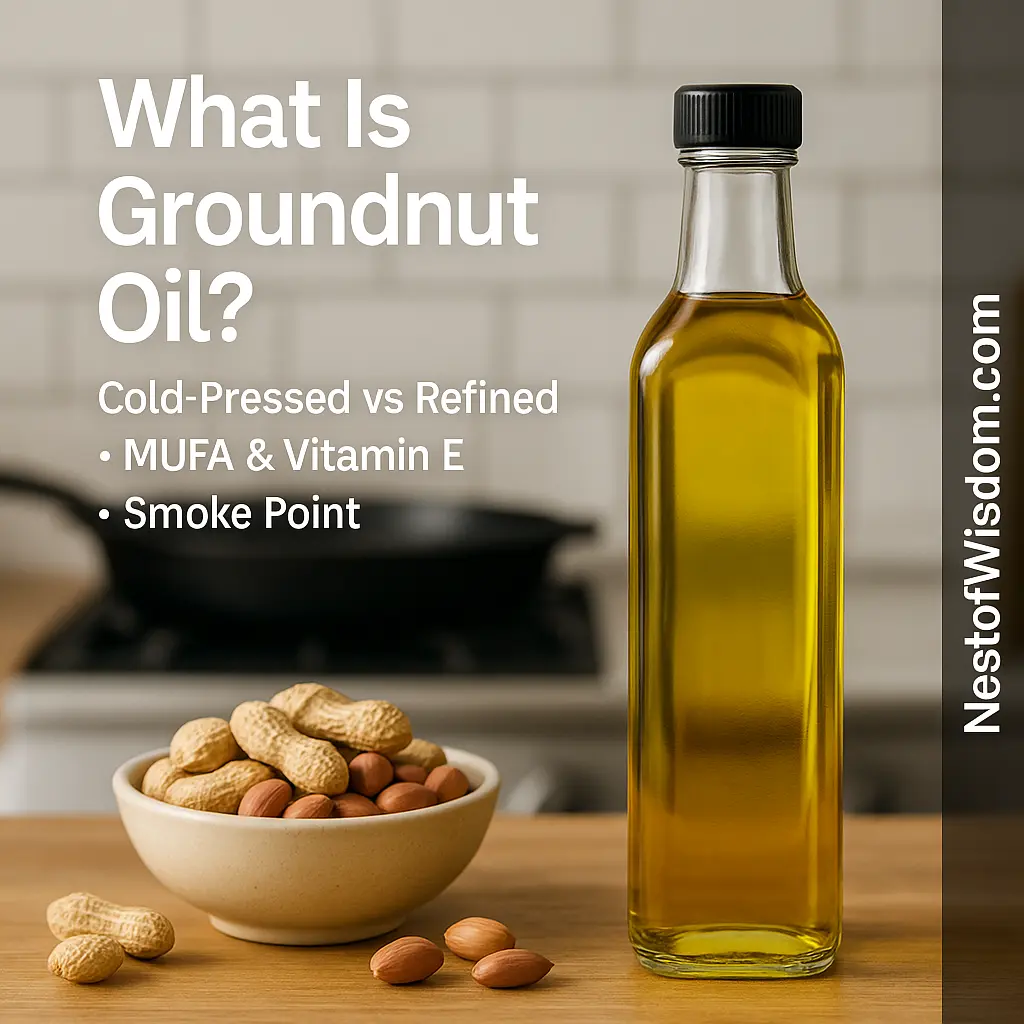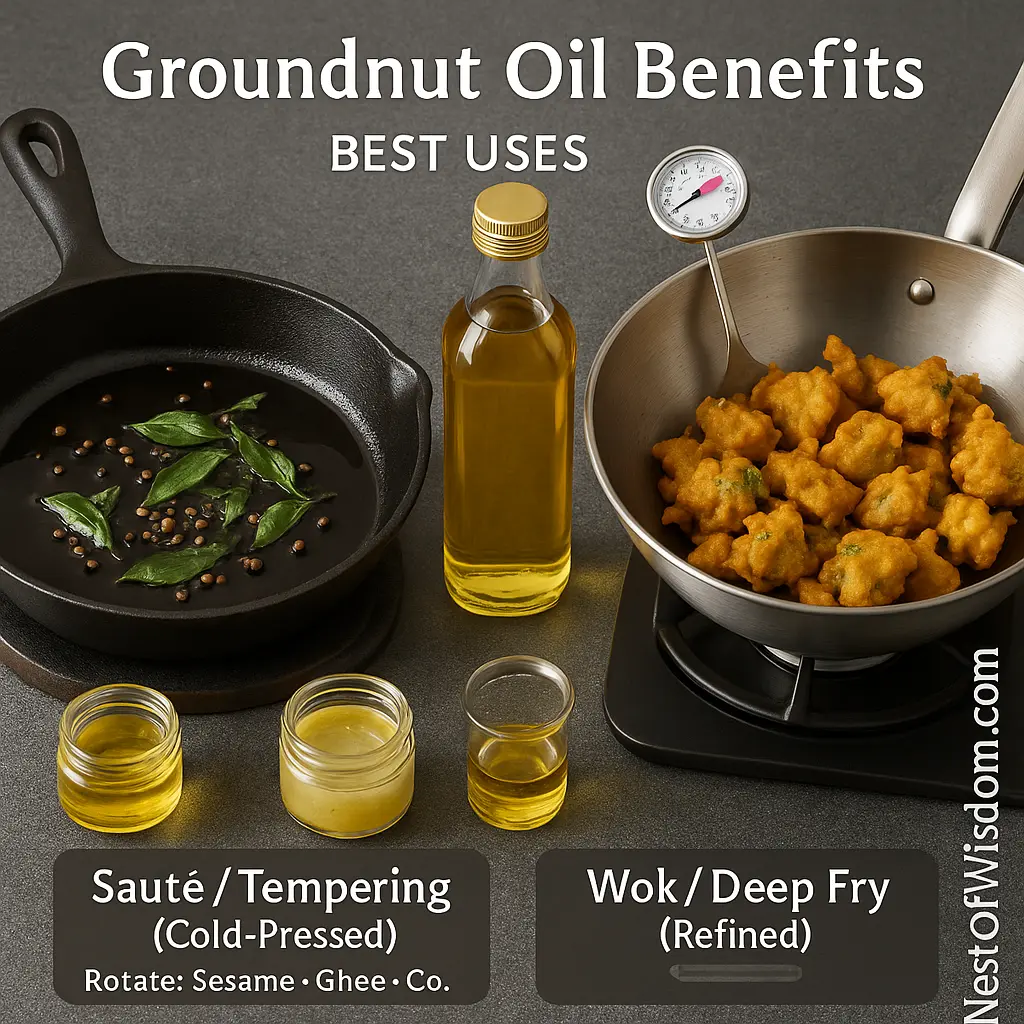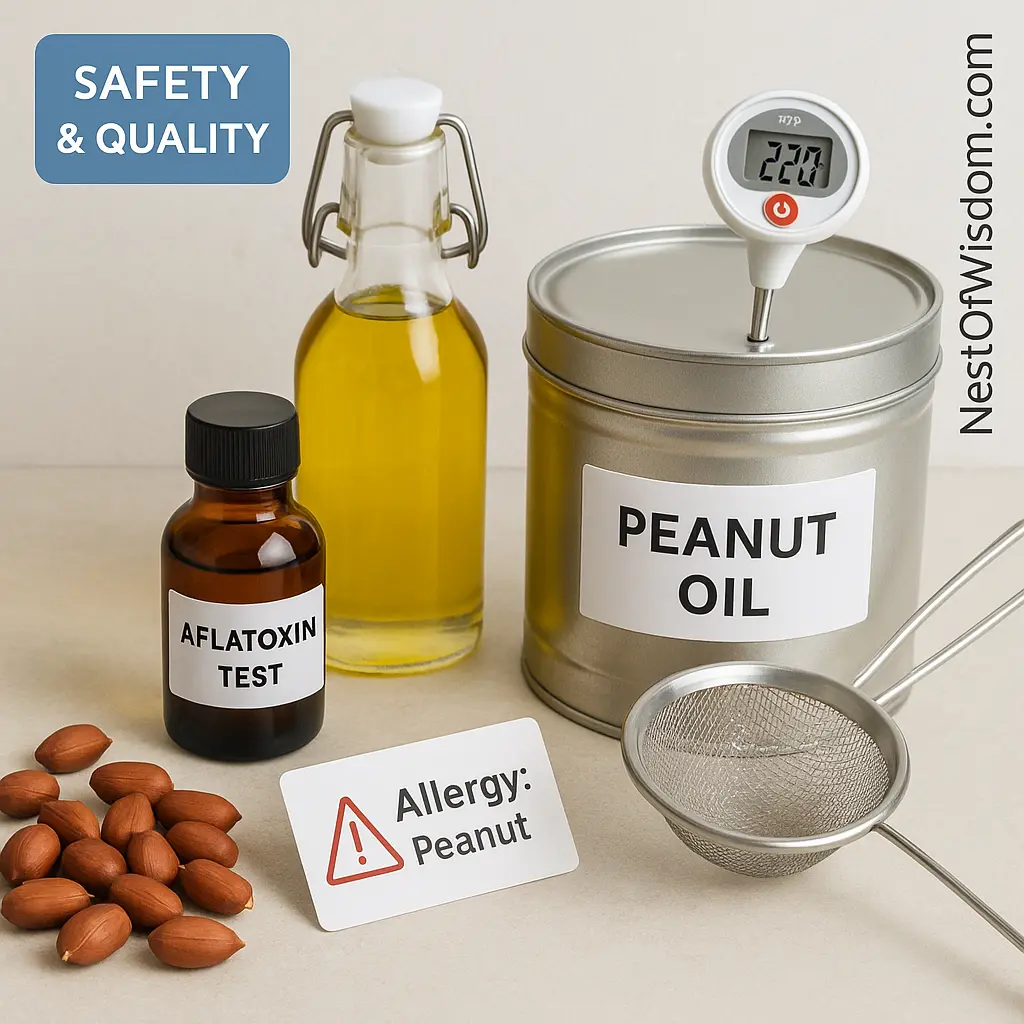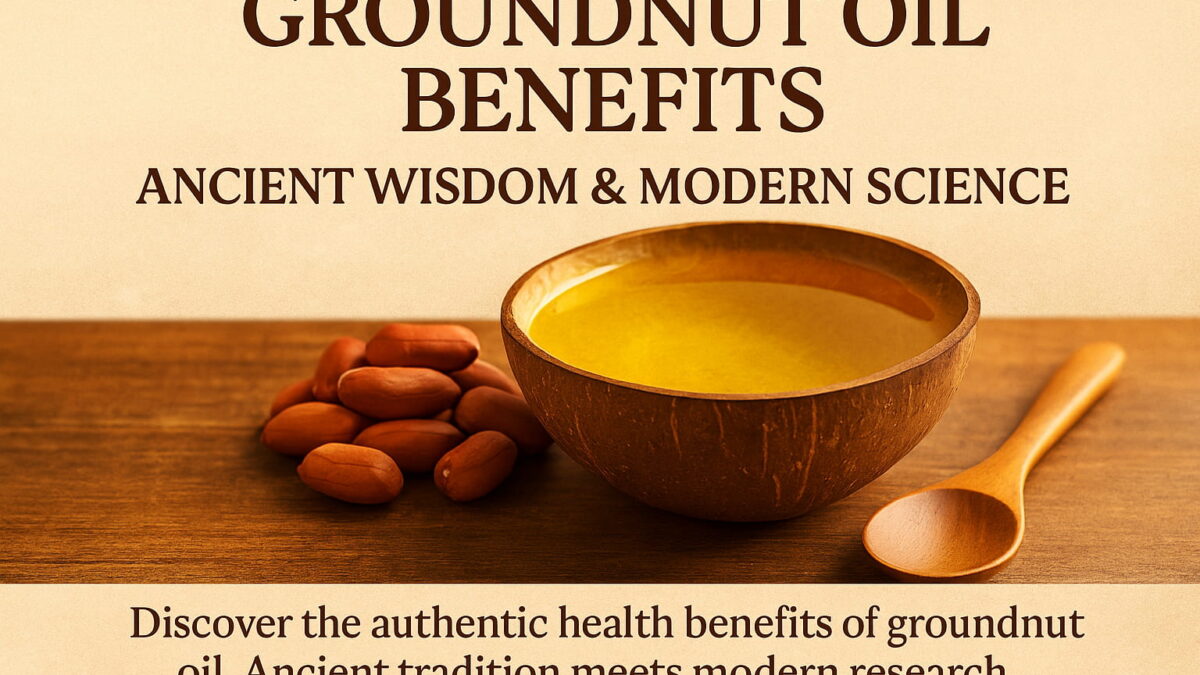Groundnut Oil Benefits are celebrated in traditional Tamil kitchens and increasingly supported by modern nutrition. This expanded guide blends ancestral wisdom with practical science so you’ll know when—and how—to use groundnut (peanut) oil for heart-smart cooking, great flavor, and reliable high-heat performance. For broader fat-quality context, see Harvard’s overview of types of dietary fat. “அளவோடு, தரமோடு பயன்படுத்தினால்—நன்மை பல.”
Quick note: Throughout this guide, we use real kitchen scenarios to show how Groundnut Oil Benefits translate into flavor, texture, and safer technique you can repeat every week.
Table of Contents
- Introduction
- What Is Groundnut Oil?
- Nutritional Profile, Vitamin E & Smoke Point
- High-Oleic Groundnut Oil: Why It Matters
- Groundnut Oil Benefits: Evidence-Backed Gains
- Best Uses in Cooking (Heat, Dishes, Pairings)
- Temperature & Technique Cheat Sheet
- Label Science & Quality Metrics (PV, AV, TOTOX)
- 7-Day Rotation Plan (Balanced Indian Kitchen)
- Storage & Shelf-Life Science
- Safety & Quality: Aflatoxin, Storage, Allergy
- Oil Reuse, Filtering & Disposal
- Buying Guide: Labels, Freshness & Red Flags
- How It Compares: Sesame, Coconut & Ghee
- Quick Recipes & Pairings
- Common Mistakes & Easy Fixes
- Myths vs Facts
- FAQs: Groundnut Oil Benefits
- Conclusion
- References
Introduction
From poriyal to pakoda, families across South India have leaned on groundnut oil for generations. Modern diet research explains why: a MUFA-forward fat profile (mainly oleic acid), naturally present vitamin E (tocopherols), and solid heat tolerance in refined varieties. The real-world result? Practical, everyday Groundnut Oil Benefits that match taste with health sense—when you pick the right type for the job and cook at controlled temperatures. For healthy cooking-oil technique (don’t overheat), Harvard’s primer is handy: healthy cooking oils & overheating cautions. “சரியான சூடு + சரியான எண்ணெய் = சரியான சுவை.”
What Is Groundnut Oil?
Groundnut oil (peanut oil) is pressed from the seeds of Arachis hypogaea. You’ll mostly encounter two kitchen-friendly types:
- Cold-pressed (wood-pressed/chekku): More aroma, retains tocopherols and phytosterols; best for sautéing/tempering where spice bloom matters.
- Refined (including high-oleic lines): Neutral taste, higher smoke point for high-heat frying and quick wok work; excellent texture with less smell.


Nutritional Profile, Vitamin E & Smoke Point
Per tablespoon (~14 g), peanut oil provides ~119–120 kcal and ~14 g fat with a MUFA-dominant profile, modest PUFA, and relatively lower saturated fat than many solid fats. For a neutral nutrient listing, see USDA FoodData Central (search “peanut oil”). Vitamin E (α- and γ-tocopherols) is naturally present and contributes to oxidative stability in the pan.
- MUFA-rich: Diet patterns that swap some saturated fat for MUFA/PUFA support better lipid profiles over time—one of the central Groundnut Oil Benefits (Harvard).
- Vitamin E: Helps protect lipids from oxidation and supports skin/cell-membrane health.
- Smoke point: Refined groundnut oil is commonly listed around ~232 °C (~450 °F) for high-heat applications; cold-pressed sits lower (~160–177 °C), ideal for gentle tempering/sauté. For practical technique tips, see Harvard’s healthy cooking oils guide and a consolidated smoke-point overview.
High-Oleic Groundnut Oil: Why It Matters
“High-oleic” (HO) peanut cultivars are bred so a greater share of fatty acids are oleic (often ~75–80% vs lower in standard lines). In practice, HO refined groundnut oil enhances Groundnut Oil Benefits where heat stability counts—deep-frying at controlled temperatures or longer service windows for home snack days.
Groundnut Oil Benefits: Evidence-Backed Gains


1) Heart-Smart Pattern (When Used Wisely)
Replacing a portion of saturated fat with MUFA/PUFA can support healthier lipid profiles. Used in normal culinary amounts—as part of a dietary pattern rich in vegetables, legumes, and whole grains—Groundnut Oil Benefits a heart-forward approach (see Harvard fats primer).
2) Antioxidant Support
Vitamin E (α- and γ-tocopherols) contributes to oxidative stability in the pan and offers general antioxidant support—useful in everyday cooking where oils face heat, air, and moisture.
3) Reliable High-Heat Performance (Refined)
Refined groundnut oil’s high smoke point yields crisp textures and fast browning. Still, avoid prolonged overheating and repeated reuse to preserve Groundnut Oil Benefits and flavor (see Harvard’s technique notes).
4) Flavor that Lets Spices Bloom
Cold-pressed groundnut oil adds gentle nuttiness, helping mustard seeds, curry leaves, garlic, and gram flours “open up.”
5) Versatility Across Indian Kitchens
Neutral enough for dosai/poriyal; robust enough for bajji/pakoda; and perfectly fine for everyday stir-fries—versatility that underpins daily Groundnut Oil Benefits.
Best Uses in Cooking (Heat, Dishes, Pairings)


- Tempering & sauté: Cold-pressed for tadka (mustard seeds, curry leaves, garlic). Ideal for dals, greens and poriyal.
- High-heat frying/wok: Refined groundnut oil for bajji, pakoda, poori, and fast stir-fries. Control temperature; avoid smoke and multiple reuse cycles.
- Pairings: Works beautifully with curry leaves, garlic, tamarind and gram flours. “சிறிதளவு எண்ணெயில் பெரிய சுவை.”
- Weekly rotation: Use groundnut oil on high-heat days; rotate with sesame (antioxidant-rich), ghee (very high-heat tadka/comfort), and coconut (light sauté/South-Indian flavor).
Temperature & Technique Cheat Sheet
- Tempering/tadka: 150–170 °C (300–340 °F), cold-pressed. Add whole spices, then aromatics. Pull pan when crackling eases—don’t chase smoke.
- Shallow fry/stir-fry: 170–190 °C (340–375 °F), refined. Fry in small batches; if the oil smells sharp or darkens quickly, rest and filter once cool.
- Deep-fry (occasional): 175–185 °C (347–365 °F), refined (HO preferred). Maintain steady heat; use a thermometer; avoid repeated reuse.
- Visual cues: Fine shimmer = ready; visible smoke = too hot. “புகை வந்தால்—பயன் குறையும்.”
Pro tip: To protect Groundnut Oil Benefits during frying, preheat gradually, monitor temperature, and avoid visible smoke so nutrients and flavor stay clean.
Label Science & Quality Metrics (PV, AV, TOTOX)
Some brands publish quality markers—useful for buyers who care about the freshest, cleanest oil and want to maximize Groundnut Oil Benefits:
- Peroxide Value (PV) and Anisidine Value (AV) reflect early and later oxidation; TOTOX combines them. Lower is fresher. Basic definitions appear across oil chemistry guides (e.g., Codex/FAO/WHO standards context).
- Free Fatty Acids (FFA/acid value): Elevated FFA often tracks with off-flavors; look for low acid value in refined HO oils.
7-Day Rotation Plan (Balanced Indian Kitchen)
Rotation prevents flavor fatigue and spreads nutrient profiles across the week—another practical way to realize Groundnut Oil Benefits without monotony:
- Mon: Cold-pressed groundnut oil for spinach poriyal + rasam tadka.
- Tue: Refined groundnut oil for a quick veggie stir-fry (high heat, small batches).
- Wed: Sesame oil for medium-heat kuzhambu; garnish with roasted sesame.
- Thu: Coconut oil for light sauté (beans/avial base).
- Fri: Refined groundnut oil for bajji/pakoda night (steady 175–185 °C; fresh oil).
- Sat: Ghee for dal tadka/comfort dishes.
- Sun: Cold-pressed groundnut oil brunch upma + peanut chutney tempering.
This simple rotation keeps Groundnut Oil Benefits while diversifying antioxidants and flavors with sesame, coconut, and ghee through the week.
“வாரமெலாம் சுவை மாற—ஆரோக்கியம் தானாக வரும்!”
Storage & Shelf-Life Science
Heat, oxygen and light slowly oxidize oils. To preserve Groundnut Oil Benefits:
- Container: Opaque glass/steel limits light; keep caps tight to limit oxygen exposure.
- Temperature: Cupboard away from stove/oven heat; avoid hot window sills.
- Batch size: Buy smaller bottles if you cook infrequently; finish within a few months of opening.
- Sensory checks: Paint-like or sharp odor = oxidized; discard.
Safety & Quality: Aflatoxin, Storage, Allergy


- Aflatoxin: A hazard from poorly handled/moldy peanuts. Reputable brands test raw material; refining steps (e.g., alkali-refining; adsorbents) can reduce residues—see a representative study on reducing aflatoxin B1 in peanut oil (PubMed). Prevention begins with clean seed and proper storage.
- Allergy: Peanut proteins trigger allergy, not pure fat. Anaphylaxis UK notes highly refined groundnut oil contains very low residual protein and is unlikely to provoke reactions in most peanut-allergic people, but individual risk varies—follow medical advice and labels; avoid unrefined/cold-pressed if allergic.
- Used cooking oil (UCO): India’s FSSAI RUCO program educates on safe reuse/disposal (e.g., total polar compounds thresholds). Smart UCO habits preserve flavor and Groundnut Oil Benefits.
Oil Reuse, Filtering & Disposal
Even with a high smoke point, no oil likes abuse. To keep practical Groundnut Oil Benefits intact:
- After frying: Let oil cool. Filter once through a fine mesh/coffee filter to remove crumbs (they accelerate oxidation).
- Limit reuse: If color darkens or aroma turns sharp, retire it. Never mix different old oils together. Where applicable, follow local guidance on total polar compounds (TPC)—see FSSAI RUCO.
- Disposal: Don’t pour down drains. Collect in a container and discard with solid waste, or check local collection programs.
Buying Guide: Labels, Freshness & Red Flags
- Cold-pressed (chekku): Choose fresh-crop, wood-pressed from a reliable mill; best for aroma-rich sauté and tempering. If it smells paint-like or stale, skip.
- Refined/HO refined: For deep-fry stability, look for “high-oleic,” expeller-pressed, low peroxide/acid values at packing. Transparent brands often publish test summaries.
- Trust marks: Basic definitions for edible oil identities and limits sit under Codex/FAO/WHO standards (context for buyers who like specs).
- Red flags: Unusually low price, no harvest/press date, or cloudy sediment in refined oils. “சந்தேகமான தரம்—தவிர்க்கலாம்.”
How It Compares: Sesame, Coconut & Ghee
- Vs Sesame Oil: Sesame brings sesamin/sesamol antioxidants and a toasty flavor for medium heat; groundnut offers higher heat capacity and neutral taste for frying.
- Vs Coconut Oil: Coconut is higher in SFA and suits low-to-medium heat and regional flavors; groundnut provides MUFA with better high-heat tolerance.
- Vs Ghee: Ghee excels at very high-heat tadka and comforting mouthfeel; groundnut delivers crisp textures with a lighter palate. Use both intentionally, not interchangeably.
- For a rotation blueprint, see Coconut Oil vs Sesame Oil vs Ghee and our Mustard Oil Benefits guide.
Quick Recipes & Pairings
- Leafy Greens Poriyal (10 min): Cold-pressed groundnut oil + mustard seeds + urad dal + curry leaves; toss chopped greens; finish with coconut scrapings and lemon.
- Crunchy Bajji: Refined groundnut oil at steady heat; batter your vegetable slices (besan + rice flour + chilli + ajwain); fry small batches; drain well.
- Speedy Wok Stir-Fry: Refined oil; garlic-ginger, beans/cabbage, splash of soy/tamarind; finish with roasted peanuts for texture.
- Protein-lifted Upma: Cold-pressed oil; temper mustard/urad/channa dal; add peanuts and rava; finish with lemon and coriander.
- Peanut Chutney Tempering: Cold-pressed oil; mustard, curry leaves, dried red chilli; pour over chutney for aroma.
“சிறிதளவு எண்ணெய்—அதிக சுவை. அதுவே புத்திசாலி சமையல்!”
Common Mistakes & Easy Fixes
- Overheating until smoke: Fix by preheating gradually and using a thermometer; smoke means nutrients and flavor are degrading—hurting Groundnut Oil Benefits.
- Reusing too many times: Fry crumbs speed oxidation; filter once and retire early.
- Using wrong oil for the job: Cold-pressed for aroma at medium heat; refined (preferably HO) for deep-fry/wok.
- Storing on the counter near heat: Move to a cool, dark cupboard; use opaque bottles.
- Buying in huge bulk but cooking rarely: Choose smaller bottles to stay within freshness window.
Myths vs Facts
- Myth: “Any oil with a high smoke point is automatically ‘healthy.’”
Fact: Smoke point helps with technique, but portion size and overall diet quality matter more for health. - Myth: “Reusing oil many times saves money.”
Fact: Old, repeatedly heated oil degrades in taste and quality. Filter once; limit reuse; retire early. - Myth: “Peanut-allergic people can never use any groundnut oil.”
Fact: Highly refined oils carry very low residual protein and are unlikely to trigger reactions in most—but medical advice and label checks are essential (Anaphylaxis UK).
Bottom line: Respect heat, freshness, and rotation to realize everyday Groundnut Oil Benefits without compromise.
FAQs: Groundnut Oil Benefits
1) Is cold-pressed or refined better for Groundnut Oil Benefits?
Both—use each for its strength. Cold-pressed preserves aroma and tocopherols for sauté/tempering; refined (ideally high-oleic) offers a higher smoke point for deep-fry and quick wok work.
2) Is groundnut oil “heart-healthy”?
It’s MUFA-rich and can support a heart-smart pattern when replacing some saturated fats. As always, total diet quality matters more than any single oil (Harvard).
3) Can people with peanut allergy use it?
Highly refined groundnut oil contains minimal protein and is unlikely to trigger reactions in most peanut-allergic people. However, risk varies; follow medical advice and avoid unrefined/cold-pressed if allergic (Anaphylaxis UK).
4) What about aflatoxins?
Choose reputable brands with testing and good storage practices. Refining can reduce residues, but prevention starts with clean raw peanuts and fresh oil (study).
5) Is groundnut oil good for deep-frying?
Refined groundnut oil (~232 °C smoke point) is suitable for high-heat frying. Keep temperatures steady, avoid smoke, filter once, and limit reuse.
6) Does groundnut oil cause weight gain?
Like all fats, it’s energy-dense. Groundnut Oil Benefits show up when used in modest amounts within a balanced diet rich in vegetables, pulses, and whole grains.
7) Is “filtered” the same as “cold-pressed”?
No. “Filtered” refers to removing particles after extraction; “cold-pressed/wood-pressed” describes extraction without high heat/solvents. For oil identity/labelling context, see Codex/FAO/WHO.
8) Can I bake with groundnut oil?
Yes—refined groundnut oil’s neutral flavor works in savory bakes and some cakes; for strong butter notes, ghee may be preferred.
Key Takeaways: Groundnut Oil Benefits
- Groundnut Oil Benefits shine when you match the oil to the job—cold-pressed for tempering, refined (HO) for steady high heat.
- Groundnut Oil Benefits include MUFA support and vitamin E; these wins show up only when you avoid overheating and repeated reuse.
- Groundnut Oil Benefits are easier to keep if you buy smaller bottles, store cool and dark, and finish within a few months of opening.
- Groundnut Oil Benefits pair well with a weekly rotation (sesame, coconut, ghee) so you get variety without losing frying performance.
- Groundnut Oil Benefits extend to taste and texture—crisp pakoda, clean stir-fries, and aromatic tadka with minimal oil waste.
Conclusion
Groundnut Oil Benefits make it an excellent everyday choice: cold-pressed for aroma-rich tempering and refined (preferably high-oleic) for occasional high-heat frying. Rotate with sesame, coconut, and ghee; buy fresh; store well; and avoid overheating. Respect these simple rules and you’ll enjoy flavor, texture, and peace of mind—meal after meal. For big-picture oil choices and safe technique, Harvard’s guides on dietary fats and healthy cooking oils are a solid companion. “அளவில், அறிவுடன்—ஆரோக்கியம் உங்கள் கையில்.”
Related on NestOfWisdom: Sesame Oil Benefits · Coconut Oil Benefits · Ghee Benefits · Mustard Oil Benefits · Coconut Oil vs Sesame Oil vs Ghee
References
- Harvard T.H. Chan — Types of fat (MUFA/PUFA vs SFA)
- Harvard — Healthy cooking oils & overheating cautions
- USDA FoodData Central — nutrient listings (peanut oil)
- Anaphylaxis UK — Peanut oil factsheet
- FSSAI RUCO — Used Cooking Oil (UCO) program
- PubMed — Alkali refining reduces aflatoxin B1 in peanut oil
- Codex/FAO/WHO — Standards context for edible oils
- Smoke point ranges for cooking oils (overview)
Nest of Wisdom Insights is a dedicated editorial team focused on sharing timeless wisdom, natural healing remedies, spiritual practices, and practical life strategies. Our mission is to empower readers with trustworthy, well-researched guidance rooted in both Tamil culture and modern science.
இயற்கை வாழ்வு மற்றும் ஆன்மிகம் சார்ந்த அறிவு அனைவருக்கும் பயனளிக்க வேண்டும் என்பதே எங்கள் நோக்கம்.
- Nest of Wisdom Authorhttps://nestofwisdom.com/author/varakulangmail-com/
- Nest of Wisdom Authorhttps://nestofwisdom.com/author/varakulangmail-com/
- Nest of Wisdom Authorhttps://nestofwisdom.com/author/varakulangmail-com/
- Nest of Wisdom Authorhttps://nestofwisdom.com/author/varakulangmail-com/
Related posts
Today's pick
Recent Posts
- Internal Linking Strategy for Blogs: A Practical, Human-Centered Playbook
- AI in the Automotive Industry: A Practical, Human-Centered Guide
- Cloud Tools for Small Businesses and Freelancers: The Complete Guide
- Generative AI in Business: Real-World Use Cases, Benefits & Risks
- 7 Life-Changing Daily Habits for Weight Loss Without Dieting

